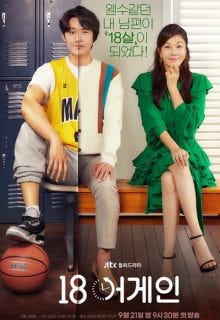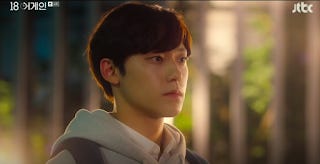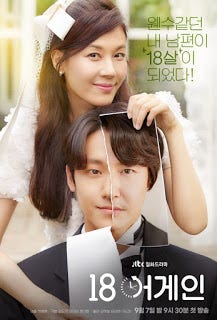18 Again (2020) Early Impressions
Despite watching around three times more dramas in 2020 than in any year prior, I still managed to miss out on one of the year's gems. An online, fellow Kdrama watcher sang its praises recently and it's been at the back of my mind to get to it at some point. A couple of days ago a city-wide lockdown was announced for this weekend which provided an opportunity to for a marathon watch.

18 Again is one of those sorts of storytelling excursions that Kdramaland excels in. A white goods repairman (Yoon Sang-hyun) suffering midlife crisis and marriage woes looks back on his life bogged down by regrets, lamenting on missed opportunities. He and his wife (Kim Ha-neul) put aside career aspirations as 18-year-olds when she falls pregnant with twins, no less. They both made the tough choice at that age of keeping the babies and raising them. Hong Dae-young, the male lead seems to have hit rock bottom when his wife demands a divorce and a long-awaited promotion bypasses him. On top of that he barely has a relationship with his children.

On one occasion he meets an enigmatic elderly man during a repair job. The latter notes that Dae-young has a knack for fixing things but Dae-young remarks that he can't seem to fix his own life. The elderly man offers help but Dae-young notes that since the problems are his, he should try fixing them. One night while he's shooting hoops at a local school, a weather event occurs and Dae-young fantastically reverts back to his younger 18-year-old body.
Body-swapping stories over the years have provided a comical platform for telling stories about framing regrets and shifting perspectives on one's life. At the end of it, the character(s) involved will have become more reflective and come to the "right" conclusions about where their priorities should be. However, as someone who brings a certain parental lens to this, the show delves into a larger range of topics that I personally find relatable. The drama evoked many emotions. It reminded me of much... not least that many things my own parents did and said only really made sense to me after I started raising my own children. Dae-young's journey to reconnect with his own children is one of the show's highlights as it points to the trans-generational issues that seem to beset every era. It's also a highly insightful exploration (so far) of why misunderstandings and estrangements occur. Much ink has been spilt over the generation gap since I was old enough to read and understand newspapers. But there are good objective reasons why in certain cultures (including the one I was raised in) age is reverenced over youth. The show to my mind makes a reasonable case for acquired wisdom through life experiences.
With the benefit of hindsight and experience, Dae-young in his younger body (Lee Do-hyun) sets to "fix" things. From his newly acquired perspective, he discovers that his son, Si-woo although a talented basketballer like his father, is reluctant to play the game and is being relentlessly bullied. He stumbles on the fact that his daughter is working at a convenience store because she has other ideas about her future that don't include higher education. School, he soon notes, is a complex space of continual negotiation of hierarchical structures and external influences with its own set of problems. It also emerges as an ongoing subplot that a bribery scheme has been at play among the basketball players for some time.
But it isn't just the case that parents don't always know what their kids get up to outside of the home. Children can't always make sense of the adults in their lives as they don't have a full picture of what goes on behind the scenes when matters are deliberately concealed from them. In trans-generational conflict the importance of being able to stand in someone else's shoes or at the very least view things from a different perspective is absolutely key to some form of resolution.
Dae-young's wife, Da-jung on the other hand, has never lost her interest in television broadcasting, practising for the craft in spare moments and applying for jobs when possible. She edges closer to fulfilling a lifelong dream now that the children are reaching their completion of high school. When she's finally selected for her dream job, she faces all kinds of discrimination -- ageism, and for the fact that she's a working mother. who is divorced. Which apparently is a workplace taboo of sorts in her cultural context. To her credit, she perseveres and proves repeatedly that she has the confidence, natural talent and skills to be at the top of the game. The irony which is not lost on the viewer is that Da-jung perceived weaknesses turn out to be assets. For instance, when she is put on the spot to do a quick interview with a baseball player, she carries it off like a pro and gets instant praise for being quick to react as well as her surprising knowledge of baseball. As an older woman and mother, she's had to learn to adapt to situations in life and her baseball knowledge has come from years of spending time with a baseball fanatic at home in the form of her former spouse.
Da-jung too has things she doesn't know about the husband that she gradually grew weary of. His inner turmoil and the hardships that he encountered as a far-too-young father and husband. As life got harder, they both (I think) forgot what it was that they liked about each other and kept them going for the longest time. They both had to re-educate themselves to find their way back to each other.
The show handles Da-jung's relationships with different men with fascinating sensitivity. It isn't that she'd stopped loving Dae-young but she thought he'd change for the worst. So when new admirers come on to the scene, she maintains a respectful distance because in part it's too soon and in part she's got a ton of things to worry about. Her relationship with Lee Do-hyun's Dae-young is what you'd expect in such a situation. Because of his youthful looks, she's instinctively maternal to some degree (once she gets past his remarkable resemblance to her former husband) but she's also confused by reminders of Dae-young in his gestures and speech. She must also be conscious to some degree that his attentions to her are far beyond that of a unusually mature teenage boy.
With all of these ingredients in the mix, the drama is a guaranteed feel-good watch as the show charts the highs and lows of Dae-young's old and new life. The firm and steady directing elicits credible performances from the entire cast from the very youngest to the most senior. Special mention should be made of Lee Do-hyun who shoulders enormous responsibility as the younger versions of Dae-young: firstly as a young dad fresh out of high school and then also the middle-aged man inside the body of a youngster. He is particularly memorable and humorous when he forgets that he's not supposed to be the 37-year-old Hong Dae-young.



